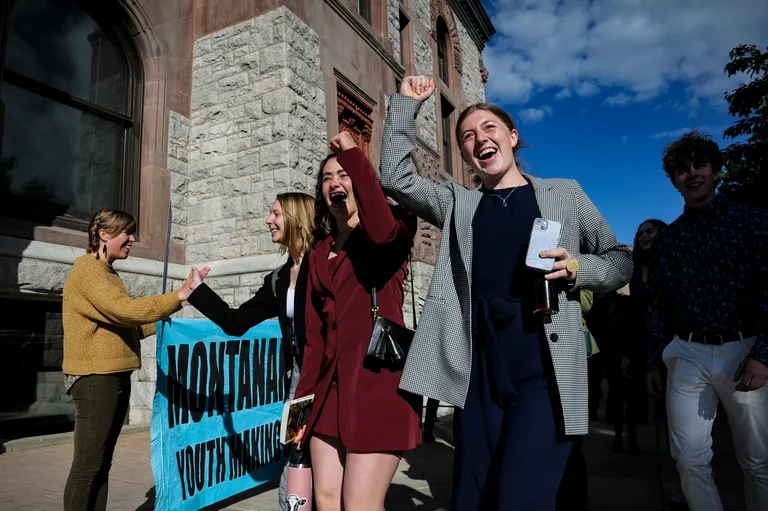HELENA, Mont. (AP) — Young environmental activists scored what experts described as a ground-breaking legal victory Monday when a Montana judge said state agencies were violating their constitutional right to a clean and healthful environment by allowing fossil fuel development.
The ruling in this first-of-its- kind trial in the U.S. adds to a small number of legal decisions around the world that have established a government duty to protect citizens from climate change.
If it stands, the ruling could set an important legal precedent, though experts said the immediate impacts are limited and state officials pledged to seek to overturn the decision on appeal.
District Court Judge Kathy Seeley found the policy the state uses in evaluating requests for fossil fuel permits — which does not allow agencies to look at greenhouse gas emissions — is unconstitutional.
It marks the first time a U.S. court has ruled against a government for violating a constitutional right based on climate change, said Harvard Law School Professor Richard Lazarus.
“To be sure, it is a state court not a federal court and the ruling is based on a state constitution and not the U.S. Constitution, but it is still clearly a major, pathbreaking win for climate plaintiffs,” Lazarus wrote in an email.
The judge rejected the state’s argument that Montana’s emissions are insignificant, saying they were “a substantial factor” in climate change. Montana is a major producer of coal burned for electricity and has large oil and gas reserves.
“Every additional ton of GHG (greenhouse gas) emissions exacerbates plaintiffs’ injuries and risks locking in irreversible climate injuries,” Seeley wrote.
However, it’s up to the Montana Legislature to determine how to bring the state’s policies into compliance. That leaves slim chances for prompt changes in a fossil fuel-friendly state where Republicans dominate the statehouse.
Only a few states, including Pennsylvania, Massachusetts and New York, have constitutions with similar environmental protections.
“The ruling really provides nothing beyond emotional support for the many cases seeking to establish a public trust right, human right or a federal constitutional right” to a healthy environment, said James Huffman, dean emeritus at Lewis & Clark Law School in Portland.
State officials had tried to derail the case and prevent it from going to trial through numerous motions to dismiss the lawsuit.
Claire Vlases was 17 years old when she became a plaintiff in the case. Now 20 and working as a ski instructor, she said climate change hangs over every aspect of her life.
“I think a lot of young people feel really helpless, especially when it comes to the future,” Vlases said, adding that she expects Montana lawmakers to respect the state’s constitution and abide by the court’s decision.
“Hopefully this is one for history,” she said.
Emily Flower, spokesperson for Montana Attorney General Austin Knudsen, decried the ruling as “absurd” and said the office planned to appeal. She criticized Seeley for allowing the plaintiffs to put on what Flower called a “taxpayer-funded publicity stunt.”
“Montanans can’t be blamed for changing the climate,” she said. “Their same legal theory has been thrown out of federal court and courts in more than a dozen states. It should have been here as well.”
Attorneys for the 16 plaintiffs, ranging in age from 5 to 22, presented evidence during the two-week trial that increasing carbon dioxide emissions are driving hotter temperatures, more drought and wildfires and decreased snowpack.
The plaintiffs said those changes were harming their mental and physical health, with wildfire smoke choking the air they breathe and drought drying out rivers that sustain agriculture, fish, wildlife and recreation. Native Americans testifying for the plaintiffs said climate change affects their ceremonies and traditional food sources.
The state argued that even if Montana completely stopped producing C02, it would have no effect on a global scale because states and countries around the world contribute to the amount of C02 in the atmosphere. A remedy has to offer relief, the state said, or it’s not a remedy at all.
Seeley said the state’s attorneys failed to give a compelling reason for why they were not evaluating greenhouse gas emissions. She rejected the notion that Montana’s greenhouse gas emissions are insignificant and noted that renewable power is “technically feasible and economically beneficial,” citing testimony from the trial indicating Montana could replace 80% of existing fossil fuel energy by 2030.
Since its founding, Our Children’s Trust has raised more than $20 million to press its lawsuits in state and federal court. No previous attempts reached trial.
Carbon dioxide, which is released when fossil fuels are burned, traps heat in the atmosphere and is largely responsible for the warming of the climate. This spring, carbon dioxide levels in the air reached the highest levels they’ve been in over 4 million years, the National Oceanic Atmospheric Administration said earlier this month.
July was the hottest month on record globally and likely the warmest that human civilization has seen, according to scientists.
